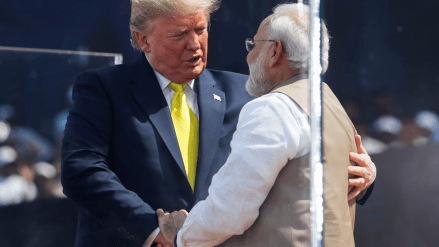India-US trade: India is among several countries now expressing willingness to lower tariffs in response to sweeping United States trade measures, US Trade Representative Jamieson Greer told the Senate Finance Committee. Speaking after President Donald Trump announced a 26% reciprocal tariff set to take effect this month, Greer highlighted India’s average agricultural tariff of 39%, compared to the US average of 5%, as an example of the imbalance that Trump seeks to address.
US tariff hike
Greer noted that approximately 50 countries have approached the US to negotiate relief from Trump’s broad-based import tariffs.
“Nearly 50 countries have approached me to discuss the President’s new policy and explore how to achieve reciprocity. And they’ve spoken with many members of the administration. Several of these, such as Argentina, Vietnam, India and Israel, have suggested that they will reduce their tariffs and non-tariff barriers in line with the President’s policy,” he said.
WATCH: @USTradeRep Jamieson Greer opening statement before @SenateFinance @senfinance. pic.twitter.com/zr8qtVvH6X
— CSPAN (@cspan) April 8, 2025
White House Press Secretary Karoline Leavitt added that nearly 70 nations have contacted the administration for potential trade deals, signalling a global effort to soften the impact of Trump’s aggressive tariff policy.
However, Mark Linscott, former Assistant US Trade Representative, praised India’s measured approach to tariffs imposed under Trump. He described India’s response as “remarkably smart,” both in handling earlier threats and now the actual tariff implementation. Linscott pointed out that Prime Minister Narendra Modi’s early visit to Washington after Trump’s inauguration helped establish strong diplomatic ties. “It was quite a successful meeting,” he noted.
Since the announcement of the tariffs, India has chosen not to retaliate—a move Linscott supports. He warned that Trump has a tendency to escalate tensions when other nations respond with countermeasures. “We’ve seen how the President reacts when other countries indicate they will retaliate—he responds with more retaliation,” Linscott said, adding that India’s restraint may help maintain room for dialogue and avoid further trade friction.
Trade wars and market turmoil
The tariffs have rattled markets and drawn criticism from business leaders. However, Greer maintained that the moves were necessary to correct long-standing trade imbalances that have devastated US manufacturing and agriculture. “The collapse of our manufacturing base is not accidental—it’s the result of non-reciprocal tariffs and unfair barriers,” he said, calling it a “national security emergency.”
Greer said Trump’s directive is to secure “tailor-made deals” that benefit American workers. Countries including Argentina, Vietnam, Israel, and India have shown readiness to reduce both tariff and non-tariff barriers under this policy framework. While acknowledging the economic adjustments could be challenging, Greer said the aim is to restore fairness and reduce the $1 trillion US trade deficit.
(With inputs from agencies)
